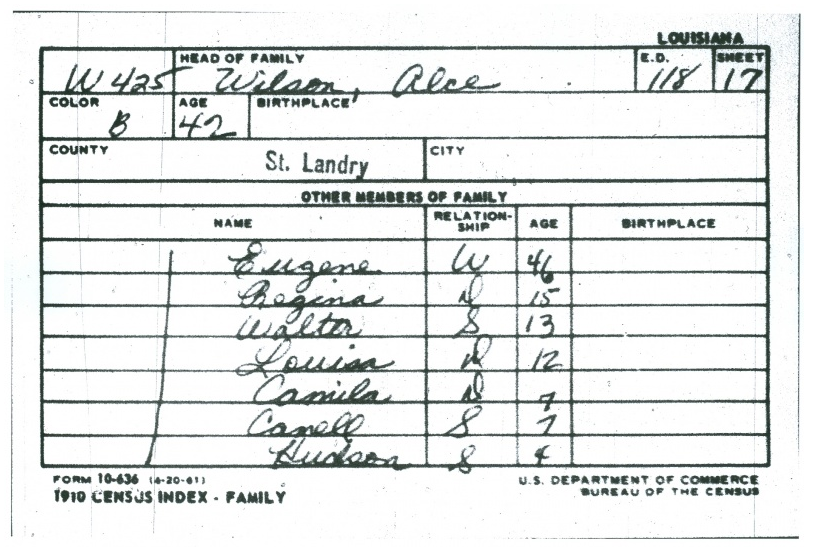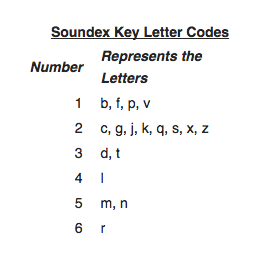Soundex is something that is often offered as a method of search on genealogy research websites. But, do you really know what it means and how to use it to your advantage when searching for your ancestors? Have you ever tried to use Soundex, but couldn’t figure out what to do with it? Then, you are missing out on some potentially excellent family history discoveries. Here is what you need to know about the Soundex, what it is, and how to use it.
Soundex is the name of a method of coding family names and indexing them based on the way the name is phonetically spelled. In Soundex, the code uses the first letter of the family surname, which is followed by three numbers that represent the first three phonetic sounds of that name. Family surnames that have similar sounds have similar Soundex codes.
This method of coding and indexing family surnames was invented for use with the census and the people who worked with it at the government level. Today, it can be invaluable in helping you locate your ancestors in the census if their surname was spelled incorrectly. This is a common phenomenon in the census, since so many census takers spelled unusual names phonetically, or spelled them the way the family said them, which often involved phonetic spelling based on regional accents. It may not have been recorded on the census the way it is truly spelled. If you haven’t been able to find your ancestors in the census, it doesn’t necessarily mean they were not included in it. It may mean you are looking for the right spelling when it was spelled incorrectly.

1910 U.S. federal census Soundex family card
The Soundex code can help you find them. Soundex is currently used with 1880, 1900, 1910, and 1920 censuses, with government workers applying it to these census records in 1930. It was also applied to the 1890 census, but most of that census no longer exists thanks to a 1930’s era fire at the archives building that was storing them. What little remains of the 1890 census can be searched using Soundex. Soundex is also used on modern census records that have not yet been released to the public. It continues to be a good indexing tool for census records used by the U.S. Federal government.
It is also used by the information departments of telephone companies to help callers locate the people they want to call; it is useful in discovering the phone number of a person with a difficult to spell the last name, or one that has several possible variations in spelling. Many state DMV’s also use the Soundex for the beginnings of driver’s license numbers. Usually, in the states that use it, the first letter and first three numbers of the driver’s license number are the Soundex code for the person’s surname.
These are the main things you need to know in order to effectively use the Soundex code in your census research.
- The first letter of the Soundex code for a family surname is always the first actual letter of that surname.
- If the family surname is hyphenated, only the last portion of the name receives the three-digit code after the first letter. As an example, a family with the hyphenated surname of Smith-Jones would be classified as Jones in the Soundex, with the Jones code of J-520.
- If the family surname starts with a prefix, like La, Van, or De, the prefix is not included in the Soundex code. The exceptions are Mc, Mac, and O’, which are considered part of the full surname and are included in the first letter of the surname in the Soundex code.
- The numbers that are assigned to the surname after the first letter are based on phonetic sounds, reading from left to right on the name.
- Surnames that are short have a zero added to the end of them to get the required three digits. Names that are long do not include digits beyond the requisite first three.
- If the surname has the same Soundex number as another surname, but are separated by a vowel use the letter to the right of the vowel for the number in the code.

Soundex Key Letter Codes
Knowing these things should make it easier to find the surnames you’re looking for in census records. The Soundex code, however, is not perfect. It does have some limitations in searching, which you should know before you begin using it to find your ancestors.
- The Soundex code was designed to be used with English names and English sounds. There is no way to Soundex a name that uses a different alphabet or different sounds than those used in the English language. Russian, Hebrew, and Arabic names, for example, may not have the letters or sounds necessary to be used in the Soundex.
- In European countries that use English lettering and sounds, there are sometimes silent letters, particularly at the end of a surname. This is common in France, for example. In Soundex, these silent last letters are included in the code.
- Even in English, there are sometimes family surnames that sound exactly the same but have different spellings. “Smith” and “Smyth” are examples of these. In these situations, the Soundex code of these names is the same.
- If surnames sound alike but start with different letters, such as names that start with C or K, the Soundex code will begin with the actual first letter of the name. If the rest of the name is spelled the same, such as with Croft and Kroft, the last three digits will be identical for both names, but the first letters will be different.
- There are some surnames that do not look or sound like each other in any way but still have the same Soundex code. This can occur with short surnames or names with a lot of vowels in them.
These things can make it more difficult to find the name you’re searching. However, if you practice using it and keep applying different possible variations on your ancestor’s surname to the Soundex, the chances of you eventually finding them in the census is quite high.
Soundex Converter
Enter a surname to find other surnames sharing the same Soundex code.






